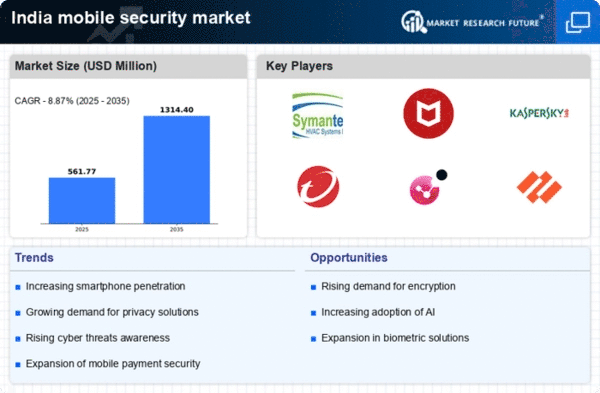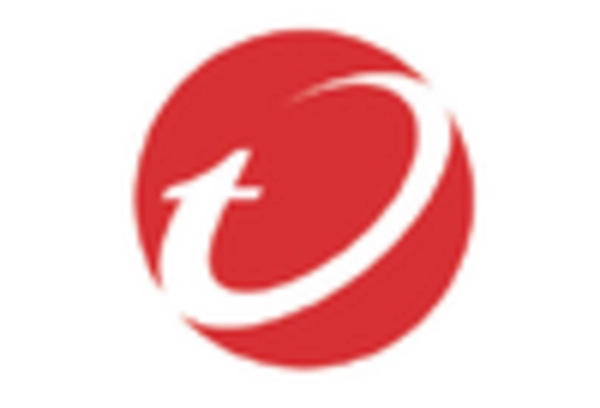Rising Cyber Threats
The mobile security market in India is experiencing a surge due to the increasing frequency and sophistication of cyber threats. Reports indicate that cybercrime incidents have escalated by over 30% in recent years, prompting businesses and individuals to prioritize mobile security solutions. As mobile devices become primary tools for communication and transactions, the vulnerability to malware, phishing, and data breaches intensifies. This environment compels organizations to invest in advanced security measures, thereby driving growth in the mobile security market. The need for robust security frameworks is further underscored by the rising adoption of mobile banking and e-commerce, which are particularly susceptible to cyber threats. Consequently, The mobile security market is likely to expand. Stakeholders are seeking to mitigate risks associated with these evolving threats.
Consumer Awareness and Education
As awareness of cybersecurity issues increases among consumers in India, the mobile security market is poised for growth. Educational campaigns and media coverage have highlighted the risks associated with mobile device usage, leading to a more informed user base. This heightened awareness encourages individuals and businesses to seek out mobile security solutions to protect their data and privacy. Surveys suggest that nearly 70% of consumers are now more concerned about mobile security than they were a few years ago. This shift in mindset is likely to drive demand for security applications and services, as users become proactive in safeguarding their digital assets. The mobile security market is expected to expand as companies respond to this growing consumer demand for enhanced security features and solutions.
Increased Mobile Device Penetration
The proliferation of mobile devices in India is a key driver of the mobile security market. With smartphone penetration reaching approximately 50% of the population, the reliance on mobile devices for personal and professional activities has never been higher. This widespread adoption creates a fertile ground for cyber threats, as users often overlook security measures. Consequently, there is a growing demand for mobile security solutions to protect sensitive information stored on these devices. The mobile security market is likely to benefit from this trend, as both consumers and enterprises seek to safeguard their data against potential breaches. Additionally, the rise of remote work and mobile applications further amplifies the need for comprehensive security strategies, indicating a robust growth trajectory for the mobile security market in the coming years.
Government Initiatives and Regulations
The Indian government is actively promoting digital security through various initiatives aimed at enhancing the mobile security market. Policies such as the Digital India initiative and the National Cyber Security Policy emphasize the importance of securing mobile platforms. The government has also introduced regulations that mandate compliance with data protection standards, which in turn drives demand for mobile security solutions. As organizations strive to adhere to these regulations, investments in mobile security technologies are expected to rise. Furthermore, the government's focus on creating a secure digital ecosystem encourages collaboration between public and private sectors, fostering innovation in mobile security solutions. This regulatory landscape is likely to propel the mobile security market forward, as compliance becomes a critical factor for businesses operating in the digital space.
Emergence of Advanced Security Technologies
The mobile security market in India is being propelled by the emergence of advanced security technologies such as machine learning and blockchain. These innovations offer enhanced protection against evolving cyber threats, making them attractive to businesses and consumers alike. The integration of machine learning algorithms into mobile security solutions enables real-time threat detection and response, significantly improving security posture. Additionally, blockchain technology provides a decentralized approach to data security, which is gaining traction among organizations looking to secure transactions and sensitive information. As these technologies become more accessible, the mobile security market is likely to witness increased adoption, driven by the need for cutting-edge solutions that can effectively combat sophisticated cyber threats. This trend suggests a dynamic future for the mobile security market as it adapts to technological advancements.
















